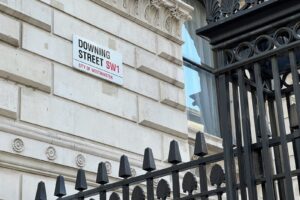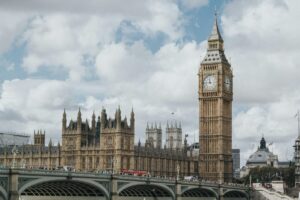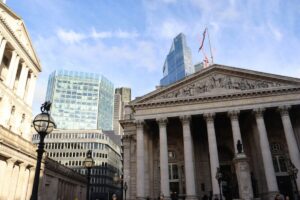We’ve been here before but this time we’re older and apparently none the wiser about regulatory matters. In this, his latest blog for IFA Magazine, JB Beckett (pictured) cranks the hands of the regulatory timepiece back to Lehman, Brexit and beyond, asking whether we’re forgetting why the rules existed in the first place. As ever JB brings a sharp and unique perspective, this time on how the market forgets. Warning: contains traces of Time Machine.
Note: JB attended and spoke at a recent Transparency Task Force event where he spoke on regulation cycles. It’s a subject on which JB has shared guest opinion with IFA Magazine before HERE. The event was organised as a response to FCA comments on a recent BBC Moneybox programme and asked in an open letter to the U.K. Financial Services Select Committee Chair HERE
Tick follows tock. I will set out why time is everything when it comes to regulation. So step into my Time Machine. It is September 15th, 2008, Lehman Brothers, the fourth largest investment bank in the US, founded in 1850, declares bankruptcy! What unfolded was unimaginable.
The day the system stopped ticking.
The system broke. Time stopped! It was the epicentre of the Great Financial Crisis, one that spread from the US mortgage market to engulf the whole of Wall Street then the World. Many lost their jobs, their homes, their savings, their pensions, some lost their lives. At the time bankers, poor regulation coupled with complex financial innovation and risk-taking was blamed. At the time we did not know if banking, or even the financial system would survive. The notion of ‘too big to fail’ and ‘casino banking’ became common speak… Then, sometime around March 2009, the clock started again.
Regulation rushed in – and stayed.
In the aftermath we were left in this highly reflective and protective regulatory state, led by increasing EU regulation. In firms too… culture suddenly became much more risk averse, with more controls, more risk committees, more risk staff, more rules, more reporting, and much more computer based training. Yet the culture of catharsis continued in the U.K. and Europe for many years after, partly due to the European Sovereign Crisis and recession hangover but also the regulatory aims of the European Commission, which doubled down on regulation. The US did not do the same, at least not at the same time nor in the same way.
Capital fled regulation and found new homes.
That de-risking of banks also moved capital and risk into Asset Management and Alternative Finance, creating a shadow banking sector and a universe of unregulated investing. System risk was not reduced, it simply changed. By 2015 the US was already well into recovery and by 2017 Donald Trump began to liberalise US banking and an acceleration of “US Exceptionalism” as the dollars flowed out of the U.K. and Europe into the US, it in turn capitalised the rise of Big US tech stocks and US banks… In his second term Trump has accelerated that deregulation of Wall Street.
Time passes, and memories fade.
TIME: 25 years have passed since the Dotcom crash, nearly 17 years have passed since Lehman Brothers, 15 years since the Flash Crash by High Frequency Traders… 14 years since the Euro Sovereign Crisis, 9 years since the Brexit referendum and over 5 years since the start of the COVID pandemic. Time moves on… Governments come and go, money flows, the industry grows. Tick follows tock.
From protection to red tape: how risk perception evolves.
How then memory of risk fades. As time passes, fear subsides to greed and we move from a collective perception of regulation as being for needed protection… to one of “bureaucracy” stifling competition and growth. This doesn’t happen overnight, it happens gradually with time. As economist John Maynard Keynes would argue, “animal spirits” is simply human behaviour.
The Brexit effect lingers over UK financial regulation.
It is hard to overstate the long-term effect Brexit will have on U.K. deregulation. I exchanged with colleagues, after the referendum, that the U.K. had two paths ahead, follow the US into deregulation or gold-plate its protections. The U.K. followed the US. However, what we saw was a fairly lethargic unwinding of EU rules, slowed by the Pandemic yet since the deregulation clock is speeding up.
Risk-taking is back. And this time it’s personal.
Today, inside firms, the risk culture has changed too from protection to embracing risk for better outcomes, taking risk is no longer bad but good, innovation grows and competition in turn drives firms to take even more risk to compete for assets. This is also generational as we have an entire working population who started working after the GFC, 17 years ago.
So what is regulation really for?
It seems timely to ask therefore: what is the purpose of regulation? This is fundamental to the current drive to deregulate Western Economies be that Trump’s 401k executive order, to the DOGE-stripping of US regulators, or the undermining of solvency controls and U.K. regulators by the current Treasury, to the reduction of customer protections like the Financial Ombudsman Scheme.
At its heart, regulation assumes three things.
In the simplest sense regulation is primarily there to maintain a stable money system, restrict customers making bad decisions and prevent bad actors exploiting the same customers. This assumes a few things. Firstly customers have low financial acumen, that the financial system is inherently unstable if left unchecked, and lastly that the industry cannot be trusted to self-regulate because it is inherently driven by self-interest.
We are caught in the cycles of time and politics.
If these hold true then we should recognise that time when combined with political rotation tends to perpetuate regulation cycles. A continual push and pull from left to right, all the while an aging populous and a stagnating economy. Whilst then these cycles are inevitable and can be multi-decade long, they can also be manipulated by the City and Wall Street…
Risk isn’t bad. But it needs timing, matching and boundaries.
Note regulation is not about eliminating Risk. Risk is integral to capitalism and risk can help grow money over time, the longer the time horizon the more risk that can be endured. This is textbook stuff. However risk not managed or poorly timed or poorly matched can lead to critical failure and protections are needed. Even when managed, risk can still prove capricious.
When regulation protects profit instead of people.
Our concern is when protection is reduced in favour of industry protectionism, as the Chancellor goes to the City in search of capital to finance those “Mansion Accord” ambitions! As Trump supports Wall Street earnings and bolstering the US stock market.
Politics may change — but the clock keeps ticking.
I firmly believe that, no matter which party had won the general election, eventually the same deregulation strategy would manifest. Sunak’s ‘competition’ blueprint ‘Future Regulatory Framework’ morphing into Reeves’ ‘growth’ Leeds Reforms. The ideology might sound different; the outcome looks very similar.
Less regulation, less compliance costs, more industry profit… TIME then is everything to regulation and the clock is ticking.















